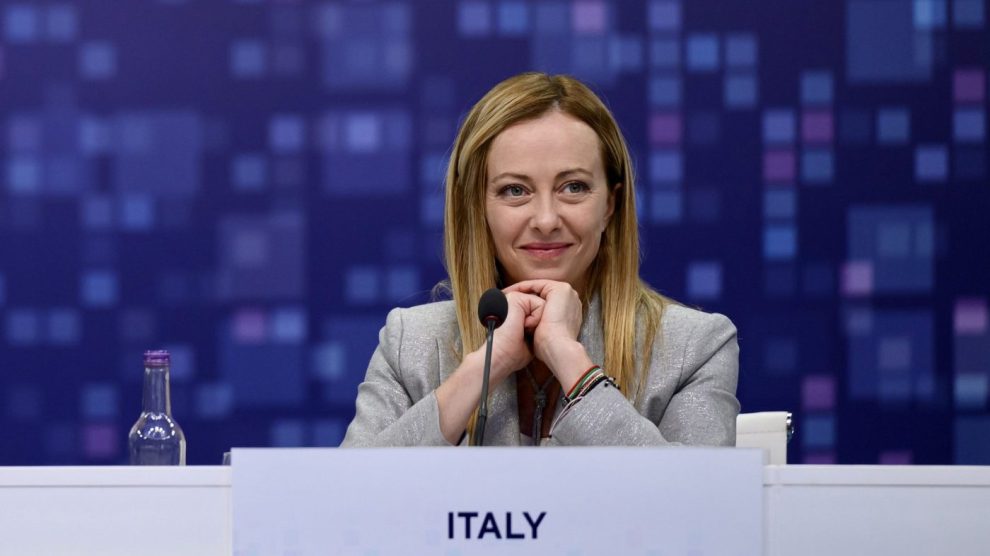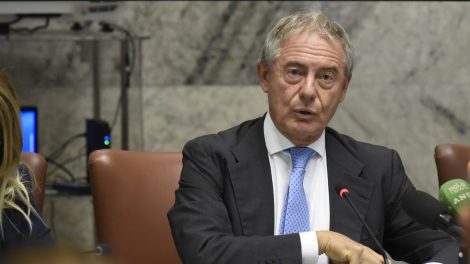The Italian-led G-7 will be big on AI. Over the past months, Italian Prime Minister Giorgia Meloni has repeatedly spoken about the urgency of regulating artificial intelligence. She brought it up at the United Nations’ General Assembly in September. She focussed on it as the only EU Prime Minister to attend the AI Safety Summit in the United Kingdom. And as Italy takes over the Group of Seven’s rotating presidency from Japan, she has vowed to make it a central focus of the collaborative work of advanced democracies.
- The Tokyo-led forum kickstarted the “Hiroshima AI Process,” a cooperative framework intended to set a shared rulebook on AI that resulted in last week’s G-7 voluntary code of conduct for companies.
- Rome intends to keep the momentum by engaging G-7 partners in constructive dialogue on key issues. And a recent speech by PM Meloni laid the foundations of that dialogue.
The name of the game. It’s best to treat AI as “the greatest intellectual, practical and anthropological challenge of this era,” stated PM Meloni while speaking to the inter-ministerial Digital Transition Committee on Thursday. She explained that she had convened the meeting in agreement with Innovation Undersecretary Alessio Butti “to take stock of the work that the government is carrying out, as a whole and through its various articulations, to respond to the enormous challenges” posed by AI.
- It is “destined to have a marked impact on geopolitical scenarios and current balances, trivially because it is a technology that can guarantee those who manage and use it a competitive advantage. Exactly as it happened, and still happens, for other technologies, starting with energy.” As history has taught, she warned, the competition to gain a lead and the differences between leaders and laggards “can give rise to tensions, if not outright conflict.”
Harnessing a tsunami. The advent of AI “changes the way we do things” not unlike that of electricity or the industrial revolution, remarked the Italian PM. This technological progress may replace human capabilities instead of optimising them, she said, noting that whereas past transitions mainly impacted physical jobs and drove people to conceptual work, “now it is the intellect that is in danger of being replaced, and this also concerns highly skilled workers.”
- That’s why regarding AI as a rule-free zone would entail “running enormous risks,” she pondered; “We risk having many people and skills in the world of work that will no longer be needed. We have seen something similar with globalisation, which has led to a verticalisation of wealth and an impoverishment of the middle class.”
- Moreover, the sheer speed of AI development could bring about industry-shaking disruptions at an unprecedented rate, as it often “exceeds the capacity of politics to keep up.” She made a parallel with the pandemic-driven supply chain shocks, which abruptly highlighted the states’ lack of control on essential provisions and showed that risk had been underestimated.
Measuring AI’s impact on work. PM Meloni once again stressed Rome’s opportunity to impact the evolution of AI governance as G-7 president in 2024. Then she reiterated her intention of holding an international conference on the relationship between AI and work, with a focus on minimising the potentially negative impacts of this transformative technology.
- Outlining a rulebook “does not mean working against companies,” she said, but rather “engaging in dialogue” with private stakeholders “in a world in which public and private interests, both legitimate, are not always overlapping and are sometimes at odds.”
- All those involved must “prevent the gap between the rich and the poor from widening, the middle class from disappearing and ultimately the impact of AI on our lives and societies from being more negative than positive.”
Dealing with AI’s ethics is one of her fixed points when talking about AI. She cited the Rome Call for AI Ethics as a starting point to tackle algorethics – i.e. embedding ethical values into algorithms – and thanked Father Paolo Benanti – who co-authored the paper and was recently appointed to the Advisory Body on AI at the United Nations Headquarters – for his contributions. Ensuring that AI remains human-centred and human-controlled is a priority, she stressed.
- Safeguarding democracies is another key concern, as the growing quality of AI-generated content has already shown its potential. The Italian PM stressed that the advent of AI “will inevitably impact our democratic systems” and remarked that the challenge “will be to avoid [foreign] interference in a world where it will not be easy to distinguish what is real from what is not.”





